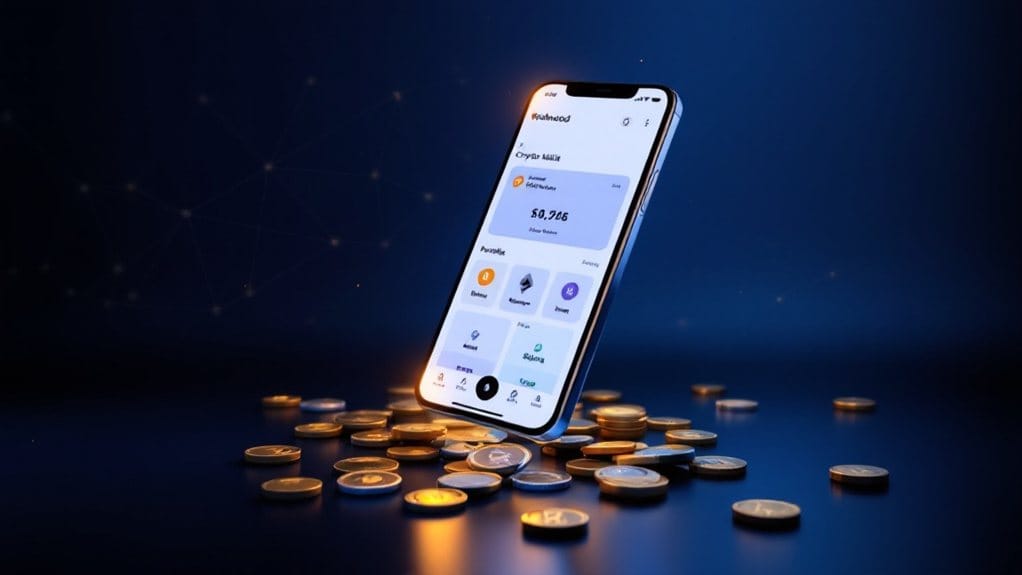Venmo offers cryptocurrency trading capabilities for verified U.S. users, excluding Hawaii residents, allowing purchases of Bitcoin, Ethereum, Litecoin, and Bitcoin Cash through the platform’s Crypto tab. Users can invest between $1 and $20,000 weekly, with a $50,000 annual limit, using their Venmo balance, linked bank account, or debit card. The service features a 0.5% spread fee and implements two-factor authentication for security, though functionality remains more limited than dedicated exchanges. Further exploration reveals significant eligibility requirements and alternatives.

As cryptocurrency continues to gain mainstream adoption, Venmo has integrated digital asset purchasing capabilities into its widely-used payment platform, allowing users to buy, hold, and sell select cryptocurrencies directly through the app. The platform currently supports four major cryptocurrencies: Bitcoin (BTC), Ethereum (ETH), Litecoin (LTC), and Bitcoin Cash (BCH), with transactions processed instantly through verified Venmo accounts. The app’s social features and emojis enhance the overall cryptocurrency trading experience.
To participate in crypto trading on Venmo, users must meet specific eligibility requirements, including maintaining a verified personal profile and residing within the United States, excluding Hawaii. Business accounts are not eligible for cryptocurrency transactions, and all users must complete identity verification by submitting required documentation while adhering to Venmo’s cryptocurrency terms and conditions.
Venmo restricts crypto trading to verified personal accounts within the US, requiring identity verification and excluding Hawaii residents and business profiles.
The platform implements strict transaction limits, with users able to purchase up to $20,000 in cryptocurrency per week and a maximum of $50,000 within a 12-month period, while maintaining a minimum purchase threshold of $1. Payment options include debit cards, linked bank accounts, and existing Venmo balances, though credit cards and Venmo Credit Cards are significantly excluded from cryptocurrency transactions. Users can access their digital assets through the Crypto tab at the bottom of the home screen. For those planning long-term investments, some users consider incorporating their Venmo-purchased crypto into self-directed IRAs for retirement planning.
Security measures for crypto transactions on Venmo incorporate two-factor authentication and robust data privacy policies, though the platform’s functionality is limited compared to dedicated cryptocurrency exchanges, particularly in its inability to transfer crypto assets to external wallets.
Transaction fees include a spread fee of approximately 0.5%, with additional fees varying based on purchase amounts and market conditions.
For users seeking wider cryptocurrency options or more flexible trading features, alternatives such as Zengo, CEX.IO, Coinbase, and Robinhood offer expanded capabilities, including wallet transfers and access to a wider range of cryptocurrencies.
These platforms may provide more extensive trading options, though users should carefully evaluate security measures and fee structures when selecting an alternative platform for their cryptocurrency transactions.
FAQs
What Happens to My Crypto if Venmo Experiences Technical Issues or Downtime?
During Venmo’s technical issues or downtime, cryptocurrency transactions may be temporarily suspended or delayed.
Users cannot cancel or reverse initiated transactions, requiring them to wait until system functionality resumes.
While Venmo maintains account records during outages, cryptocurrency holdings lack FDIC protection against platform failures.
Users experiencing persistent issues should contact Venmo’s customer support for assistance, though transaction processing delays may continue until technical problems are resolved.
Can I Transfer Crypto From Other Wallets Directly Into My Venmo Account?
Users can transfer supported cryptocurrencies (Bitcoin, Ethereum, Litecoin, and Bitcoin Cash) from external wallets to their Venmo accounts through the Crypto tab.
The process requires identity verification and proper wallet compatibility, ensuring the correct cryptocurrency address type is used.
While internal Venmo transfers are instant, external transfers may experience delays due to blockchain congestion, and network fees apply for these transactions.
Are There Tax Implications When Buying and Selling Crypto Through Venmo?
Yes, cryptocurrency transactions on Venmo have significant tax implications.
The IRS treats crypto as property, making all sales subject to capital gains tax reporting requirements. Users receive a Gains and Losses Statement from Venmo to assist with tax documentation, though maintaining personal transaction records remains crucial.
Like traditional investments, traders must report both profits and losses, while meeting IRS reporting thresholds based on transaction volumes and values.
Does Venmo Provide a Crypto Wallet Address for Each Cryptocurrency?
Venmo does not provide external wallet addresses for receiving or sending cryptocurrencies from outside platforms.
While users can store cryptocurrencies within their Venmo account, the platform maintains a closed ecosystem where crypto assets remain locked within the Venmo/PayPal network.
Transfers between Venmo users are supported without network fees, but moving crypto to external wallets requires converting to fiat currency initially.
What Security Measures Does Venmo Use to Protect Crypto Investments?
Venmo implements multiple layers of security to protect cryptocurrency investments.
The platform utilizes data encryption, secure servers, and continuous API updates for transaction protection. Multi-factor authentication and biometric security features safeguard account access, while identity verification is required for crypto transactions.
The system actively monitors for suspicious activities and maintains compliance with federal regulations, though crypto holdings are not FDIC-insured.









